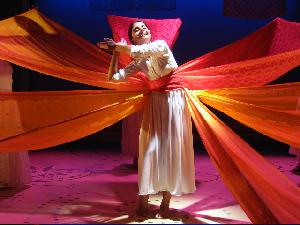SITE GUIDE
SEARCH
REVIEWS
FEATURES
NEWS
Etcetera and
Short Term Listings
LISTINGS
Broadway
Off-Broadway
NYC Restaurants
BOOKS and CDs
OTHER PLACES
Berkshires
London
California
New Jersey
DC
Philadelphia
Elsewhere
QUOTES
TKTS
PLAYWRIGHTS' ALBUMS
LETTERS TO EDITOR
FILM
LINKS
MISCELLANEOUS
Free Updates
Masthead
Writing for Us
A CurtainUp Review
Betrothed
Christopher Murray
|
I ask you, is it fair for a girl to sit out her years, pass neglected through her prime, listing labels and prices without a future? Is it wrong to envy you, all brides and mothers, busy with lives and cares? Wrong to want to shade my eyes, scent my hair? To raise a child and teach him sweet from sour, good from bad?— Bibi Haldar. |

Mahira Kakkar
|
The eighty minute evening adapted by Dickstein from three sources — a story from Jhumpa Lahiri Pulitzer-prize winning collection The Interpreter of Maladies, Anton Chekhov's Betrothed and S. Ansky's The Dyybuk— tells the stories swiftly and with recurring sweeps of ecstatic movement and scenic splendor. It is Dickstein's way of illustration the ways in which marriage stifles or seeks to fit young women into the expected roles of their culture.
Her 2005 work, Innocents, based on Edith Wharton's novel The House of Mirth and also presented at the Ohio ( CurtainUp's Review), similarly used a language of image and movement to explore the often limited options for girls and women whose desires or character leave them ill-suited for traditional nuptials and the life they are expected to lead.
In the first section, based on Lahiri's story "The Treatment of Bibi Haldar" (written when the author was just 20), the eponymous girl, (the delightful Mahira Kakkar) is subject to fits that her community decides make her ineligible for marriage. But Bibi's powerful desires will not be denied. In a stunning visual metaphor, long banners of brightly colored silk are wrapped around Bibi as she twirls around and around, creating a storm of color and light. Through her passion she is able to transform what constricts her.
The middle section based on Checkov's story "Betrothed", is about Nadya, (Lula Graves), a young woman whose initial enthusiasm for her shallow suitor is poisoned by that stock figure in Russian literature, the intellectual malcontent. Sasha, (the strong and subtle Derek Lucci) hectors Nadya to run away and attend university and learn about the world. Nadya follows his advice, almost delirious with dreams of escape and independence. The price she ultimately pays is facing that world alone, walking forward suitcase in hand, without the protection and comfort of convention.
The older generation of women (deftly represented throughout the play by Gita Reddy) are often hostile or dismissive towards those of their sex seeking to explore a different path. This conflict among mothers and daughters, sisters or mentors is a painful one. It's delicately explored, mostly through the kaleidoscopic kinesthetics of the female members of the company who flit and swerve across the stage like darting swallows.
The final section concerns the oft-told tale of a dybbuk, in Jewish folklore the soul of a dead person who possesses a living body. Leah, (Paula McGonagle), pining for her dead love Chonen, (again, Derek Lucci),is caught by his dybbuk (Daniel Irizarry). She would prefer to embrace this supernatural demon rather than to be married off to a man she does not love. "Come back to me, my bridegroom, my husband," she implores him. "I'll carry you in my heart as a dead man, and in dreams we'll cradle our unborn babies."
Each tale exposes myths and stories that different cultures have constructed to explain the unexplainable— a women who rejects the sacrament of marriage. These "unnatural" women are labeled as having been struck with some sort of malady or perversion. They are hidden or shunned.
Dickstein's vision is that of someone drunk on design and spectacle as a mechanism for showing the inner passion that stokes her heroines. This tends to obscure the play's clarity and has the actors often appearing to rush through their lines to conform to the demands of her vision.
Stoked into a controlled frenzy by Vijay Iyer's hypnotic score, ( performed live by flutist Natacha Diels and cellist Greg Heffernan) the actors tumble, roll, rush and dance across the stage forming patterns with Oana Botez-Ban's boldly monochromatic costumes. Scenic and lighting designers Susan Zeeman Rogers and Nicole Pearce transform the stage again and again during the performance, at one moment with a gentle drizzle of marigold petals, at another with a blizzard. This lushness at times threatens at times to overwhelm the storytelling.
The company is a game lot: supple, athletic, as well as intensely focused and rehearsed even though what should be impassioned, often seems frenetic. Whether raising the huppa or lowering decorative silk banners, dodging in and out of light cues or literally climbing the walls, they are at risk of almost becoming cogs in a ritualistic machine, an unintentional resonance perhaps with the theme of this production.
|
BETROTHED By Rachel Dickstein Directed by Rachel Dickstein Cast: Laura Butler (Gitl, Nadya's Double, Chorus), Lula Graves (Nadya, Messenger, Chorus), Daniel Irizarry (Dybbuk, Watchman, Chorus), Ryan Justesen (Andrey, Sender, Chorus), Mahira Kakkar (Bibi, Granny, Messenger), Derek Lucci (Sasha, Chonen, Chorus), Paula McGonagle (Leah, Nadya's Double, Chorus), Gita Reddy (Mrs. Haldar, Nina Ivanovna, Fradde), Alok Tewari (Haldar, Father Andrey, Rabbi) Scenic and Properties Design: Susan Zeeman Rogers Costumes: Oana Botez-Ban Lights: Nicole Pearce Sound Engineer: Mike Kelberman Original Music: Vijay Iyer Flute: Natacha Diels Cello and Electronic: Greg Heffernan Running Time: Eighty minutes with no intermission Ripe Time at the Ohio Theatre, 66 Wooster Street 212/868-4444 From 5/4/07 through 5/26/07; opening 5/10/07 Tickets: $25. Reviewed by Christopher Murray based on May 6, 2007 performance |

Easy-on-the budget super gift for yourself and your musical loving friends. Tons of gorgeous pictures.

Leonard Maltin's 2007 Movie Guide

At This Theater
Leonard Maltin's 2005 Movie Guide

 >
>

